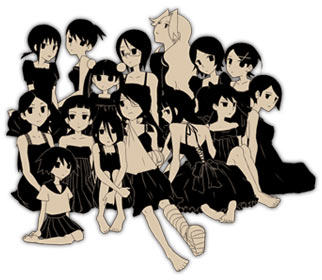Among other things, the Japanese are famous for being an indirect people, and for having a language that uses subtlety and nuance in interesting ways — some of which can be frustrating to us foreigners, who wonder why the conversation we’ve been listening to for five minutes seems to lack any verbalized sentence subjects. This unique indirectness can be seen in Japanese letters, which follow a very set form. Before you get to the point of your letter, it’s polite to write a seasonal greeting called jiko no aisatsu which changes depending on what time of year it is currently. In October you might write, “The days get colder and the autumn color of the trees deepens around us…” or in May, “The vibrant green color of the leaves has returned…” (Note, it sounds less dorky in Japanese, here is a page with some examples of these special letter-writing seasonal phrases.) If you’re in a hurry and can’t come up with something beautiful and poetic to write in your letter, there’s a word you can use (zenryaku) which essentially means, “Sorry for writing an abbreviated letter to you, I’ll move on the actual lbody of the letter now.”

Damn, I really want to go to Kyoto this fall.















